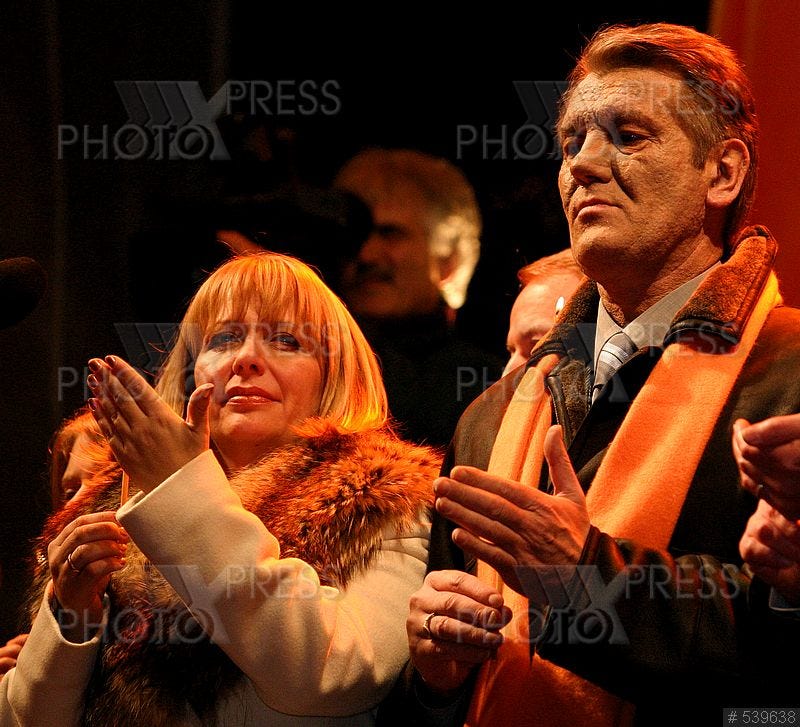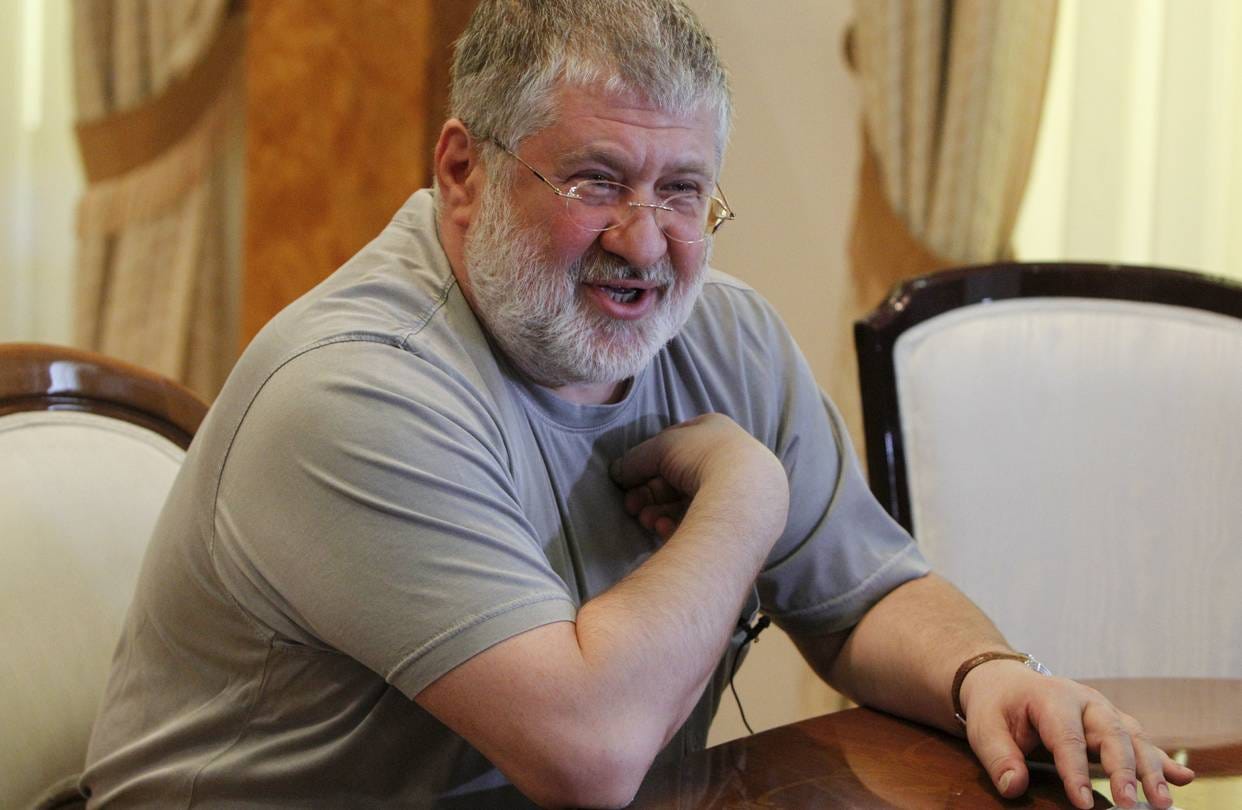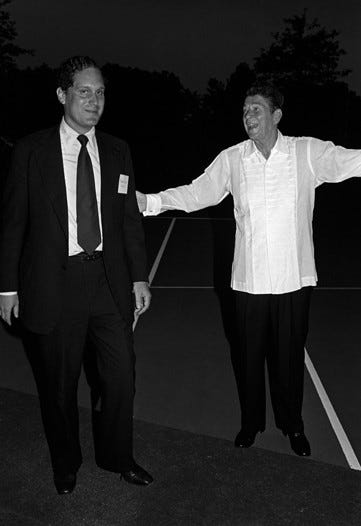Zelensky III, 2003-2013: private performance for the Russian president
The world is Zelensky’s stage, and we’re all living in it. Kvartal and the Orange Revolution. The stupid essence of political satire. Zelensky-Napoleon
Welcome back to my series tracking the life and times of the Joker of postmodern politics - Vladimir Zelensky. Vladimir and not Volodymyr, since we have very far to get to 2019, when he began making at least some efforts to speak Ukrainian.
In our last installment, we spent our requisite time getting tangled up in the backdoor deals and transnational oligarchic clan struggles behind Zelensky’s Kvartal 95 comedy studio. Today, onto something seemingly simpler – Kvartal’s output. But it will lead us onto something much more profound - the dangerous naivete at the heart of political satire, and what it reveals about Zelensky’s political essence.
On the way, we’ll have a look at Kvartal’s desacralization of power in the anarchic political landscape of post-2004 Ukraine, Zelensky’s private show for then-presidents of Russia and Ukraine (Dmitry Medvedev and Viktor Yanukovych), and how Ukrainian politicians signed contracts to be satirized by Kvartal.
The world is Zelensky’s stage, and we’re all living in it.
The Orange years
Winning a score of media awards from 2005 onwards, Kvartal 95 became the country’s most beloved media project. Much of the humour was lowest common denominator content, easily convertible to a whatsapp message for the family chat. Here’s how Konstantin Bondarenko describes it in his book on Zelensky:
For example, there’s the sketch where a husband (Volodymyr Zelenskyy) waits for his wife (Olena Kravets) on International Women’s Day (March 8th). The wife comes home drunk just before midnight, behaving provocatively and assertively. But as soon as the clock strikes twelve, everything changes—Women’s Day is over, and life returns to the familiar male-dominated world.
The scene, in its grotesque and comedic form, captured such recognizable aspects of everyday life and so accurately portrayed the behavioral psychology of men and women that it was viewed by over 10 million people in a short time!
And here is the skit in question:
However, Kvartal was also always political. 2004, the year the studio put out its first major projects, was to be a highly eventful year in the country. It was the year of the Orange Revolution, the first time that Ukraine’s pro-western liberals took power through constitutionally dubious means - at the time with a smaller contingent of nutty nationalists than in 2014. Of course, as I wrote here, that certainly didn’t stop a flock of Reaganite cold warrior CIA agents from taking the reigns in the country in the aftermath of 2004.
The events had major effects on the present and future stakeholders of Kvartal. The owner of Kvartal at the time, Kiev-born Alexandr Rodnyansky, decided it was his cue to completely move to Moscow, instead of splitting his time between the two capitals. Though he is nowadays known for his opposition to the Putin government and support for artistic freedom of expression, in a 2019 interview to the pro-western outlet Meduza he also stated his distaste for incompetent romantic nationalism that took power in Ukraine following the Orange Revolution. Rodnyansky, in short, is a somewhat rare example of the post-soviet liberal, one whose rational capacities aren’t entirely overcome by his dislike for the Russian government.
Ukrainian oligarch Igor Kolomoisky was a few years from owning Kvartal. Though as we found out in the previous article, Rodnyansky claims that Zelensky was already close to the infamous figure. Unlike Rodnyansky, Kolomoisky had no qualms about supporting the Orange camp in 2004.
In fact, as I’ve written elsewhere, Kolomoisky boasted of personally sponsoring the Orange Revolution to the tune of 5 million US dollars. His aim has always been to destabilize any overly centralizing governments – the best government is one you don’t notice, as he told interviewers. Hence, he sponsored the Orange Revolution in 2004 against President Kuchma, the Euromaidan protests in 2013-14 against President Yanukovych, and then the Zelensky ‘movement’ in 2019 against President Poroshenko.
The Orange Revolution demonstrated that Ukrainian politics would not continue along the path of centralization being charted at the time in Russia, Belarus, or Kazakhstan. Instead, Kuchma’s attempts to do so were shattered by a coalition of competing oligarchs, western-funded liberal activists, and nationalists. I’ve written at length on the American interests involved.
One also has to wonder what Ronald Lauder was doing at the time - he was the American ultra-zionist Republican hawk who financed Kvartal alongside Rodnyansky. I also covered him in the last installment. I wouldn’t be surprised if he did his best to aid the Oranges.
I am sure Lauder would have gotten along very well with the Israeli citizen Kolomoisky. Furthermore plenty of Ukrainian-Americans who’d worked in the Reagan administration - where Lauder started his political career - made their way into the halls of Ukrainian power following the victory of the Oranges in 2004. One of them was Kateryna Chumachenko, who became Ukrainian first lady - ‘Washington’s Rasputin’, as I described her here. Media played a major role in the 2004 events, and Lauder’s network of Ukrainian media assets would have been handy.

While the street desacralized state power in practice, Kvartal did the same on the screen. It came into its own under the Yuschenko (2005-2010) and Yanukovych (2010-2014) governments.
Keep reading with a 7-day free trial
Subscribe to Events in Ukraine to keep reading this post and get 7 days of free access to the full post archives.






